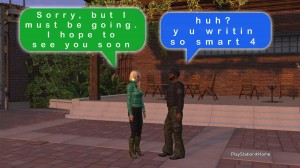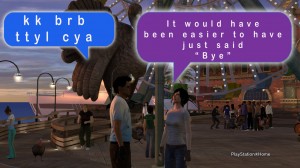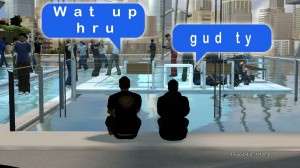Keep Your Asterisks to Yourself: Why Communication in the Digital Age Still Matters, Dammit
by kozfear, HSM guest contributor
“When one person communicates to another through the medium of language something takes place between them that is found nowhere else in nature. This ability to turn meaningless grunts into spoken and written words constitutes humanity’s most important distinction. Language has made possible the development of those characteristics that differentiate Homo sapiens from all other creatures.” —Robert Bolton
Home is a virtual social network, a digital space supported by games and populated with a broad spectrum of people from all ages, races, beliefs, religions, educational and professional backgrounds. Some forfeit sleep in favor of Call of Duty, others on the altar of Skyrim, and a few play no games at all. Yet one thing a large swath of the Home population seems to have in common is an absolute, utter disregard for language. I do not say this from some elitist platform of socialized contempt, but as a human being attempting to understand other human beings.
I understand that people text more than they write these days; that the Post Office is in hospice because actual, physical letters are as scarce as corporate empathy. But in a generation driven more towards written text than perhaps any to come before, I assert that our attention to language must increase rather than suffer the steep decline I have witnessed. I do not contend that Home users—or any other internet-savvy, linguistically crippled population—are stupid. Rather, I fear, most simply do not care.
 I don’t have an English degree; I didn’t even finish High School (though I did attain my Equivalency). One thing I do have, however, is a passion for communication, the main purpose and function of all forms of language we possess. Language is how we communicate what we want, need, feel, hope, dream, fear, aspire and relate to. Language translates our thoughts and impulses to all the not-ourselves out there. So why do so many people embrace such virulent antipathy towards what they have to say?
I don’t have an English degree; I didn’t even finish High School (though I did attain my Equivalency). One thing I do have, however, is a passion for communication, the main purpose and function of all forms of language we possess. Language is how we communicate what we want, need, feel, hope, dream, fear, aspire and relate to. Language translates our thoughts and impulses to all the not-ourselves out there. So why do so many people embrace such virulent antipathy towards what they have to say?
“i [sic] guess i never really thought about it,” one Home user explained to me. “its [sic] just not one of those things i [sic] pay alot [sic] of attention to.”
“WTF is ur [sic] fkn [sic] prblem [sic],” exclaimed another. “its [sic] jst [sic] fkn [sic] home.”
True, it is “just” Home, but I’ve found it to be a great arena of reflection towards many popular attitudes, communication among them. The general consensus seems to be that, as a casual social experience, what you say doesn’t matter, and how you express it even less so.
The problem is that it doesn’t end at the casual social experience. Language aptitude is based primarily on patterns of learned behavior and reinforcement, which is why the reading of books increases both vocabulary and grammatical proficiency. Common sense aside, where are we headed – as a culture – when our personal expressions are granted so little value?
The deluge of textual information we field on a daily basis may be one contributing factor. Perhaps words have simply lost their weight. Maybe verbal and written language is an archaic system that will give way to more image- and gesture-based modes of communication. It might be I’m grasping for something that is simply no longer there.
“your [sic] so stupid y [sic] u [sic] care wut [sic] i [sic] say newayz [sic].” My “so” is stupid? Your Alot is better than my Alot? Why are people suddenly howling like wolves all the time in Home? “Hrrruuuu!”
Yet words and their multi-dimensional meanings still bring great value to my life. I do not expect others to pore over dictionaries and games of Scrabble with the same orgiastic enjoyment I may or may not be guilty of. But I would hope that people should take care to express what they mean instead of excreting some vague approximation.
Aside from all that, the charges that the way I speak and type are intended to belittle other people is really irritating. We all utilize language in different ways, and this is how I use mine. As a life-long artist, communication itself has always been important to me. I realize it is not going to be important to everyone, but take this further quote from Robert Bolton into consideration:
“Each moment with another person can be an opportunity for discovery and growth or for the erosion of identity and the destruction of one’s personhood. Our personality development and mental and physical health are linked to the caliber of our communication. One does not become fully human without interaction with other human beings. Indeed, the philosopher Martin Heidegger refers to language as ‘the dwelling place of being.’ Each person matures through enhancing dialogues with others.”

I can think of few other examples as better environments for this possibility than Home. We’re given the opportunity to share our thoughts, ideas, and feelings with people across the world in an entertaining atmosphere of minigames and gesticulating avatars. So why not do our best to ensure we say what we actually mean?
(Editor’s note: For further reading, and/or help in general with the written word, please go read The Oatmeal’s grammar comics. They’re all in easy-to-read, super-fun comic form, so you can be entertained while you learn, and learn without even realizing it. Isn’t that neat? Now go. Read them. Now.)



Those pictures remind me of how I tried to talk on Home last summer while I was trying to fit in. Thank goodness I found literate people to be friends with and can be myself once again.
Well done Kozzmopolitain, well done. I certainly enjoyed this article. KK BAI LULZ.
Welcome back Koz! We missed you! I agree wholeheartedly with your assessment Koz, I sometimes want to break out and sing the song that Professor Higgins sings in My Fair Lady, “Why Can’t the English Learn How to Speak!” We are as he says, “Murdering the English tongue.” That is why when I have heard as many WASSUP as I can take in a day I start to reply with quips like “everything but my paycheck!”
Swearing is a real bother to me as well, both in real life and in Home. I don’t swear, I learned not to when my son was a baby, so that he wouldn’t learn it, and I have never looked back. Even though the censors catch most of it in Home, many have found their way around it by purposely misspelling the words. To me doing a lot of swearing is just a sign that someone doesn’t know how to express themselves with words. It is being lazy.
Great article! I look forward to your next contribution.
Terrific article Koz! I’m glad someone (you!) had the courage to step up and call foul on the blatant and obvious destruction of our beloved language. Two-thumbs up!
Wonderful article. On many occasion I have not been able understand what someone was saying to me in their broken, cryptic text. Is it really that hard to put the “H” in “what”? It is obvious that they intentionally spelled the words the way they do. I wonder why they do, knowing how to spell it correctly. Are they saving keystrokes? “Wayz” is the same either way. Do they think they are being clever? Being hip? I had a discussion at work about whether texting spellings are going to have an effect on the English language, where it will evolve to include these alternate spellings. Again a very enjoyable article to read.
will text shorthand effect the english language?
already has:
http://dictionary.reference.com/browse/lol
I wasn’t meaning acronyms, as they relate to correct word spellings. I was meaning texting word spellings such as “wat”. What gets me most about “wat” is that I have never heard anyone actually say “wat” in real life. I can accept an evolution of language that incorporates phonetic alternate spellings, but not “wat.”
Wat R U Talkn bout Koz? I c nothn rong wit the way peps talk n Home!
Jokes aside, I completely agree. People on Home, and the internet, butchers language. You can, however, imbue your conversation with personality using little langustic quirks. I have a friend who sort of adds a lisp to their text conversations. Some like it, some find it annoying.
Of course… the inability to USE a language doesn’t count as a quirk.
Darned good thing people don’t talk like they did in the 50s saying stuff like be bop a lula and other such things. And the beats came along with their crazy words and then what? Just when language was getting normal which made some teaches happy the hippies came along with their verbiage. Lord have mercy! And the press!!! Yes the press I said. Some nutty writer dissected the words to Puff the Magic Dragon and proclaimed it to be a song hidden with drug references which hurt the feelings of the writers. Little Jackie Paper might have have been the newspaper writer’s name but since it was such a long time ago I don’t remember. I thought language was getting back to normal in the 80s and 90s but boy was I wrong. Yes I was. Along came rap. Nuttin’ gainst rap but I didn’t have a clue on what they were talking about. Kind of like be bop a lula revisited. And what about the jazz lexicon from before the 50s? Answer me that. I apologize for not knowing the meaning of the word paragraph. One thing I noticed in my travels is that people in different areas talk differently than peeps in other areas. Way different. Sha boom sha boom.
I think you’re mistaking changes and additions to vocabulary, as well as slang, vernacular, accents, and dialects with the subject I was addressing. I have no problem with the aforementioned—Shakespeare himself invented thousands of words. As a student and writer of philosophy, I often have to create words to please the jargonites (see, I made up a word right there).
What saddens me is that many people no longer give a damn about the quality of their language. They don’t feel it’s important. All the things you mentioned serve to enrich a language, but when people stop caring, it falls into decay. That is my lament.
Nah, I didn’t write it right to make my point.
People of different ages and decades and centuries talk differently and also if from different areas and cultural upbringing. You say, “Let’s go to Walmart.” in whatever dialect and I say “Let’s go Walmart.” in Yooperese (a real word). I wish I could use a different example that popped into mind but it’s obscene.
Peeps often talk the way their peers do. As for the shortcut typing you cited, it’s a shortened way of communicating, that’s all. If one doesn’t understand it then they either they learn or go elsewhere. I go elsewhere.
You’re correct as to dialect and accents. But couldn’t the shorten typed words be looked at as dialect?
People should use proper English if they wish to communicate to a wider audience. If to a closed audience… well, whatever.
It was a good article and makes good points.
doo wap she bop
Wow, I really regret missing this article when it initially appeared in HSM. I think you hit the nail on the head regarding dialects Fleetfoot. I just can’t help wondering if one’s distaste of a given way of speaking -or abbreviating- may in some way be driven by one’s distaste of a given culture.